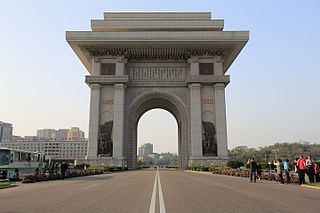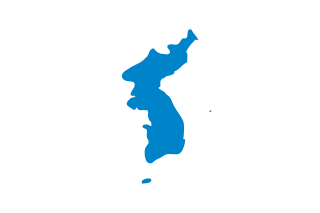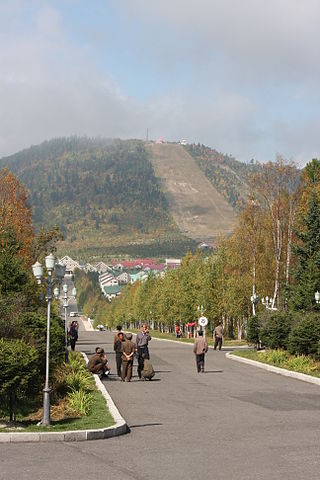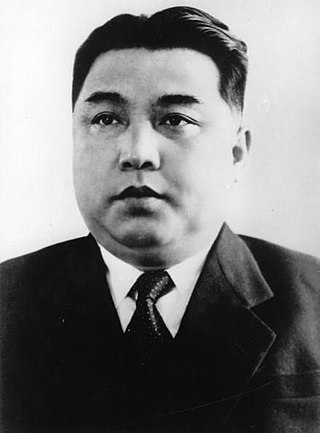| |||||
| Centuries: | |||||
|---|---|---|---|---|---|
| Decades: | |||||
| See also: | Other events of 2008 Years in North Korea Timeline of Korean history 2008 in South Korea | ||||
The following lists events that happened in 2008 in North Korea.
| |||||
| Centuries: | |||||
|---|---|---|---|---|---|
| Decades: | |||||
| See also: | Other events of 2008 Years in North Korea Timeline of Korean history 2008 in South Korea | ||||
The following lists events that happened in 2008 in North Korea.
The 2008 North Korea Census recorded the population of North Korea as 24,052,231 inhabitants (11,721,838 male and 12,330,393 female). [1]

North Korea, officially the Democratic People's Republic of Korea (DPRK), is a country in East Asia. It constitutes the northern half of the Korean Peninsula and borders China and Russia to the north at the Yalu (Amnok) and Tumen rivers, and South Korea to the south at the Korean Demilitarized Zone. The country's western border is formed by the Yellow Sea, while its eastern border is defined by the Sea of Japan. North Korea, like its southern counterpart, claims to be the sole legitimate government of the entire peninsula and adjacent islands. Pyongyang is the capital and largest city.

The Korean People's Army encompasses the combined military forces of North Korea and the armed wing of the Workers' Party of Korea (WPK). The KPA consists of five branches: the Ground Force, the Naval Force, the Air Force, Strategic Force, and the Special Operation Force. It is commanded by the WPK Central Military Commission, which is chaired by the WPK general secretary, and the president of the State Affairs; both posts are currently headed by Kim Jong Un.

Pyongyang is the capital and largest city of North Korea, where it is sometimes labeled as the "Capital of the Revolution". Pyongyang is located on the Taedong River about 109 km (68 mi) upstream from its mouth on the Yellow Sea. According to the 2008 population census, it has a population of 3,255,288. Pyongyang is a directly administered city with a status equal to that of the North Korean provinces.

Korean reunification is the hypothetical unification of North Korea and South Korea into a singular Korean sovereign state. The process towards reunification of the peninsula while still maintaining two opposing regimes was started by the June 15th North–South Joint Declaration in June 2000, was reaffirmed by the October 4th Declaration in October 2007 and the Panmunjom Declaration in April 2018, and the joint statement of United States President Donald Trump and North Korean leader Kim Jong Un at the Singapore Summit in June 2018. In the Panmunjom Declaration, the two countries agreed to work to officially end the Korean conflict in the future.

Kim Jong Il was a North Korean politician who was the second supreme leader of North Korea. He led North Korea from the death of his father Kim Il Sung in 1994 until his death in 2011, when he was succeeded by his son, Kim Jong Un. Afterwards, Kim Jong Il was declared Eternal General Secretary of the Workers' Party of Korea (WPK).

Kimjongilia is a flower named after the late North Korean leader Kim Jong Il. It is a hybrid cultivar of tuberous begonia, registered as Begonia × tuberhybrida 'Kimjongilhwa'. When Kim Jong Il died in December 2011, the flower was used to adorn his body for public display. Despite its name, the Kimjongilia is not the official national flower of North Korea, which is the Magnolia sieboldii. Another flower, Kimilsungia, is an orchid cultivar named after Kim Jong Il's father and predecessor, Kim Il Sung.

Juche, officially the Juche idea, is the state ideology of North Korea and the official ideology of the Workers' Party of Korea. North Korean sources attribute its conceptualization to Kim Il Sung, the country's founder and first leader. Juche was originally regarded as a variant of Marxism–Leninism until Kim Jong Il, Kim Il Sung's son and successor, declared it a distinct ideology in the 1970s. Kim Jong Il further developed Juche in the 1980s and 1990s by making ideological breaks from Marxism–Leninism and increasing the importance of his father's ideas.
Kim Jong Chul, sometimes spelled Kim Jong Chol, is a son of former North Korean Supreme Leader Kim Jong Il. His younger brother is current Supreme Leader Kim Jong Un. His older half-brother Kim Jong-nam was assassinated in February 2017.

Sinŭiju, is a city in North Korea which faces Dandong, Liaoning, China, across the international border of the Yalu River. It is the capital of North P'yŏngan province. Part of the city is included in the Sinŭiju Special Administrative Region, which was established in 2002 to experiment with introducing a market economy. In recent years, the city, despite lagging behind the development in the capital Pyongyang, has seen a small construction boom and increasing tourism from China.

The Korean Central News Agency (KCNA) (Korean: 조선중앙통신) is the state news agency of North Korea. The agency portrays the views of the North Korean government for both domestic and foreign consumption. It was established on December 5, 1946, and now features online coverage.

Samjiyŏn is a city in Ryanggang Province, North Korea. It takes its name from three lakes in the city, which are collectively known as the Samjiyŏn. Samjiyŏn is situated near Mount Paektu, and tour groups fly to the city's airport to see the mountain, which holds significance in North Korean mythology. Samjiyon is the least populated city in North Korea.
The mass media in North Korea is amongst the most strictly controlled in the world. The constitution nominally provides for freedom of speech and the press. However, the government routinely disregards these rights, and seeks to mold information at its source. A typical example of this was the death of Kim Jong Il, news of which was not divulged until two days after it occurred. Kim Jong Un, who replaced his father as the leader, has largely followed in the footsteps of both his grandfather, Kim Il Sung, and his father. However, new technologies are being made more freely available in the country. State-run media outlets are setting up websites, while mobile phone ownership in the country has escalated rapidly. "There is no country which monopolizes and controls successfully the internet and information as North Korea does," said Kang Shin-sam, an expert on North Korean technology and co-head of the International Solidarity for Freedom of Information in North Korea, a nonprofit based in South Korea. North Korea has about four million mobile-phone subscribers circa 2022—roughly one-sixth of the population and four times the number in 2012, according to an estimate by Kim Yon-ho, a senior researcher at Johns Hopkins University's School of Advanced International Studies.

The Socialist Constitution of the Democratic People's Republic of Korea is the constitution of North Korea. It was approved by the 6th Supreme People's Assembly at its first session on 27 December 1972, and has been amended and supplemented in 1998, 2009, 2012, 2013, 2016, 2019 (twice), 2023 and 2024. It replaced the country's first constitution which was approved in 1948.

Kim Jong Un is a North Korean politician who has been supreme leader of North Korea since December 2011 and the general secretary of the Workers' Party of Korea (WPK) since 2012. He is the third son of Kim Jong Il, who was the second supreme leader of North Korea, and a grandson of Kim Il Sung, the founder and first supreme leader of the country.

The Workers' Party of Korea (WPK), also called the Korean Workers' Party (KWP), is the sole ruling party of the Democratic People's Republic of Korea, commonly known as North Korea. Founded in 1949 from a merger between the Workers' Party of North Korea and the Workers' Party of South Korea, the WPK is the oldest active party in Korea. It also controls the Korean People's Army, North Korea's armed forces. The WPK is the largest party represented in the Supreme People's Assembly and coexists with two other legal parties that are completely subservient to the WPK and must accept the WPK's "leading role" as a condition of their existence. The WPK is banned in the Republic of Korea under the National Security Act and is sanctioned by the United Nations, the European Union, Australia, and the United States.

Kim Il Sung was a North Korean politician, revolutionary, and military leader. He founded the Democratic People's Republic of Korea, commonly known as North Korea, which he led as Supreme Leader from its establishment in 1948 until his death in 1994. Afterwards, he was succeeded by his son Kim Jong Il and was declared Eternal President.

The North Korean cult of personality surrounding the Kim family has existed in North Korea for decades and can be found in many examples of North Korean culture. Although not acknowledged by the North Korean government, many defectors and Western visitors state there are often stiff penalties for those who criticize or do not show "proper" respect for the former leaders of the country, Kim Il Sung and Kim Jong Il, officially referred to as "eternal leaders of Korea". The personality cult began soon after Kim Il Sung took power in 1948, and was greatly expanded after his death in 1994.

Supreme Guard Command is the personal bodyguard force tasked with the protection of North Korea's ruling Kim family. The current Supreme Guard commander is General Yun Jong-rin.

Kim Il Sung was the founder and first leader of North Korea. According to North Korean sources, the country awarded him "the title of Hero of the DPRK three times, the title of Labour Hero of the DPRK, 26 orders and 3 medals". In addition, foreign countries and organizations conferred upon him 74 orders and 152 medals.
{{cite web}}: CS1 maint: archived copy as title (link)